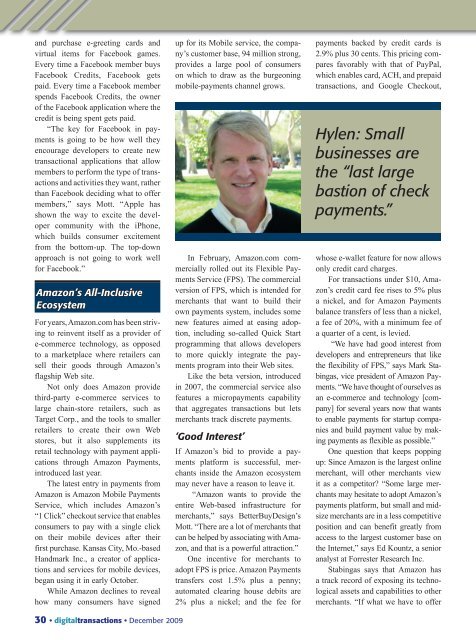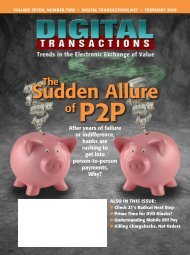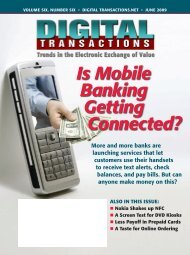Corporate America Discovers Payments - Digital Transactions
Corporate America Discovers Payments - Digital Transactions
Corporate America Discovers Payments - Digital Transactions
You also want an ePaper? Increase the reach of your titles
YUMPU automatically turns print PDFs into web optimized ePapers that Google loves.
and purchase e-greeting cards andvirtual items for Facebook games.Every time a Facebook member buysFacebook Credits, Facebook getspaid. Every time a Facebook memberspends Facebook Credits, the ownerof the Facebook application where thecredit is being spent gets paid.“The key for Facebook in paymentsis going to be how well theyencourage developers to create newtransactional applications that allowmembers to perform the type of transactionsand activities they want, ratherthan Facebook deciding what to offermembers,” says Mott. “Apple hasshown the way to excite the developercommunity with the iPhone,which builds consumer excitementfrom the bottom-up. The top-downapproach is not going to work wellfor Facebook.”Amazon’s All-InclusiveEcosystemFor years, Amazon.com has been strivingto reinvent itself as a provider ofe-commerce technology, as opposedto a marketplace where retailers cansell their goods through Amazon’sflagship Web site.Not only does Amazon providethird-party e-commerce services tolarge chain-store retailers, such asTarget Corp., and the tools to smallerretailers to create their own Webstores, but it also supplements itsretail technology with payment applicationsthrough Amazon <strong>Payments</strong>,introduced last year.The latest entry in payments fromAmazon is Amazon Mobile <strong>Payments</strong>Service, which includes Amazon’s“1 Click” checkout service that enablesconsumers to pay with a single clickon their mobile devices after theirfirst purchase. Kansas City, Mo.-basedHandmark Inc., a creator of applicationsand services for mobile devices,began using it in early October.While Amazon declines to revealhow many consumers have signedup for its Mobile service, the company’scustomer base, 94 million strong,provides a large pool of consumerson which to draw as the burgeoningmobile-payments channel grows.In February, Amazon.com commerciallyrolled out its Flexible <strong>Payments</strong>Service (FPS). The commercialversion of FPS, which is intended formerchants that want to build theirown payments system, includes somenew features aimed at easing adoption,including so-called Quick Startprogramming that allows developersto more quickly integrate the paymentsprogram into their Web sites.Like the beta version, introducedin 2007, the commercial service alsofeatures a micropayments capabilitythat aggregates transactions but letsmerchants track discrete payments.‘Good Interest’If Amazon’s bid to provide a paymentsplatform is successful, merchantsinside the Amazon ecosystemmay never have a reason to leave it.“Amazon wants to provide theentire Web-based infrastructure formerchants,” says BetterBuyDesign’sMott. “There are a lot of merchants thatcan be helped by associating with Amazon,and that is a powerful attraction.”One incentive for merchants toadopt FPS is price. Amazon <strong>Payments</strong>transfers cost 1.5% plus a penny;automated clearing house debits are2% plus a nickel; and the fee forpayments backed by credit cards is2.9% plus 30 cents. This pricing comparesfavorably with that of PayPal,which enables card, ACH, and prepaidtransactions, and Google Checkout,Hylen: Smallbusinesses arethe “last largebastion of checkpayments.”whose e-wallet feature for now allowsonly credit card charges.For transactions under $10, Amazon’scredit card fee rises to 5% plusa nickel, and for Amazon <strong>Payments</strong>balance transfers of less than a nickel,a fee of 20%, with a minimum fee ofa quarter of a cent, is levied.“We have had good interest fromdevelopers and entrepreneurs that likethe flexibility of FPS,” says Mark Stabingas,vice president of Amazon <strong>Payments</strong>.“We have thought of ourselves asan e-commerce and technology [company]for several years now that wantsto enable payments for startup companiesand build payment value by makingpayments as flexible as possible.”One question that keeps poppingup: Since Amazon is the largest onlinemerchant, will other merchants viewit as a competitor? “Some large merchantsmay hesitate to adopt Amazon’spayments platform, but small and midsizemerchants are in a less competitiveposition and can benefit greatly fromaccess to the largest customer base onthe Internet,” says Ed Kountz, a senioranalyst at Forrester Research Inc.Stabingas says that Amazon hasa track record of exposing its technologicalassets and capabilities to othermerchants. “If what we have to offer30 digitalDecember 2009







